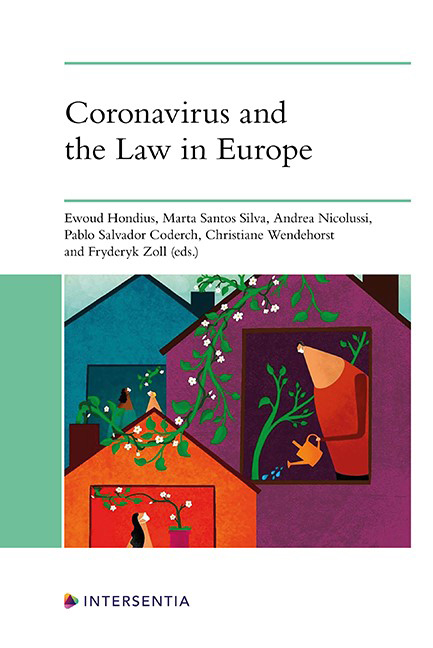Book contents
- Frontmatter
- Preface
- Contents
- List of Keywords
- List of Contributors
- PART I COVID-19 AND FUNDAMENTAL RIGHTS
- PART II STATES AGAINST THE PANDEMIC
- PART III COMPENSATION FOR COVID-19 RELATED DAMAGE
- PART IV CONTRACT LAW
- PART V CONSUMER LAW
- PART VI LABOUR AND SOCIAL LAW
- PART VII CORONAVIRUS CHANGING EUROPE
- Epilogue
- Annex: ELI Principles for the COVID-19 Crisis
- About the Editors
Annex: ELI Principles for the COVID-19 Crisis
Published online by Cambridge University Press: 10 December 2021
- Frontmatter
- Preface
- Contents
- List of Keywords
- List of Contributors
- PART I COVID-19 AND FUNDAMENTAL RIGHTS
- PART II STATES AGAINST THE PANDEMIC
- PART III COMPENSATION FOR COVID-19 RELATED DAMAGE
- PART IV CONTRACT LAW
- PART V CONSUMER LAW
- PART VI LABOUR AND SOCIAL LAW
- PART VII CORONAVIRUS CHANGING EUROPE
- Epilogue
- Annex: ELI Principles for the COVID-19 Crisis
- About the Editors
Summary
PREAMBLE
The outbreak of COVID-19 has brought immense suffering and death to a considerable number of people around the world. It has impacted fundamentally the functioning of States, their democratic institutions and legal systems. Therefore, it is understandable that governments have and are continuing to resort to exceptional measures in seeking to get control over the spread of COVID-19. These exceptional measures inevitably restrict the fundamental rights of citizens in ways that can be justified only in these extraordinary circumstances. It is in the greatest interest of society that these measures against COVID-19 are imposed and enforced within the framework of established democratic principles, the international legal order and the rule of law.
Therefore, although the spread of COVID-19 justifies limitations on the functioning of institutions such as Parliaments and courts, these limitations must be subject to democratic control, must not be misused and not applied for purposes other than measures related directly to the COVID-19 crisis.
The measures taken by governments such as mandatory quarantine, the closure of borders, restrictions in mobility, are also having a dramatic impact on business, trade and employment. It is essential that the legal measures taken to address the hardship and other difficulties caused by COVID-19 take into account principles of solidarity and fairness as well as the need for co-ordinated action between States at an international or EU level as appropriate.
In these circumstances, the European Law Institute (ELI), an entirely independent non-profit organisation established to provide practical guidance in relation to European legal development, puts forward a summary of some of the important legal issues that arise in relation to the COVID-19 crisis.
Its summary, made from an independent non-governmental perspective with due consideration of what has been published by other bodies, is set out in 15 principles. These are addressed to all European States (whether or not Member States of the EU), and are intended to guide European States, EU institutions and other bodies with the object of ensuring that everything that is done accords with the rule of law and democratic values.
- Type
- Chapter
- Information
- Coronavirus and the Law in Europe , pp. 1141 - 1152Publisher: IntersentiaPrint publication year: 2021

